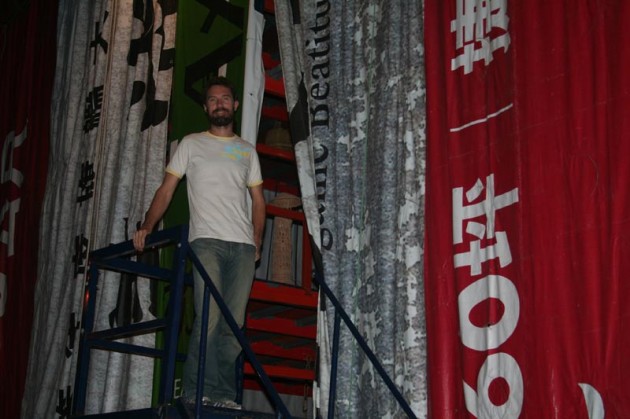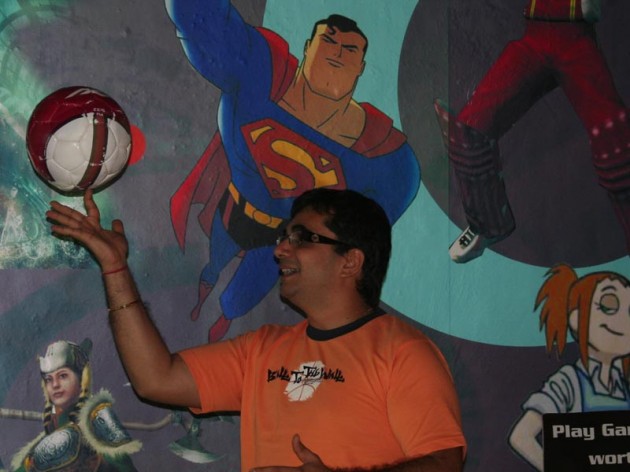 There was one complaint I heard over and over again from Indian entrepreneurs during my three weeks shuttling between Delhi, Jaipur, Bangalore, Mumbai and Pune: There aren’t enough angel investors in India.
There was one complaint I heard over and over again from Indian entrepreneurs during my three weeks shuttling between Delhi, Jaipur, Bangalore, Mumbai and Pune: There aren’t enough angel investors in India.
Now, truth be told, that’s a complaint I also hear in the American heartland, in Canada, in Europe, in Africa, in China and, well, pretty much everywhere I’ve traveled to over the last few years. I’m not sure people ever feel they’ve got enough money being thrown their way.
But there is definitely something that makes Silicon Valley and Israel different from almost everywhere else I’ve been. Both have a wide base of people who made lots of money in the late 1990s Internet boom: The Yossi Vardis and the Marc Andreessens, but also hundreds of lesser known stock option recipients who may not want to start another company, but want to stay in the game $10,000 or so at a time.
Sure, Europe has had some big hits, but a culture of being tight-fisted with stock options has kept the wealth from getting spread widely enough to create a large base of millionaires who feel comfortable backing startups. Bebo’s Michael Birch and Skype’s Niklas Zennstrom are more exceptions in London than the rule. Even a city like Seattle, which had two colossal wins in Microsoft and Amazon doesn’t see a critical mass of angel activity—or even venture activity according to Dow Jones VentureSource. Typically just under one hundred startups raise venture capital in the entire state of Washington each year. For all the talk that Boston’s venture scene is “dead,” Massachusetts still gets nearly three times as many deals.
Note, this isn’t a question of wealth. There are plenty of pockets of the super rich throughout the world. But unless you earned it from a high tech start-up, you’re culturally loath to give it out to a guy you don’t know with an unproven idea.
Angels may be considered a crucial ingredient in today’s modern startup ecosystem, but if you think about it, asking strangers to write you a $20,000 personal check for no guarantee and a chunk of stock is a pretty new phenomenon. It’s the result of a decade or more of broad-based success, not the result of one big hit. That means a healthy angel environment isn’t necessarily a sign that a place is about to take off, rather, it’s a lagging indicator of a healthy startup scene.
That brings us back to India—a place that venture capital has been pulling out of in recent years as the burgeoning 1.2 billion person domestic  market hasn’t adopted new technologies, goods and services as quickly as outside investors would have liked. (With the noted exception of telecom.) In 2008, just $1 billion venture dollars went into some 93 Indian startups, according to Dow Jones VentureSource’s Global VC Report. That puts India behind Europe, China, Israel and just barely ahead of Canada. In the first half of 2009, the numbers were even bleaker with just 25 Indian companies getting $213 million in venture capital.
market hasn’t adopted new technologies, goods and services as quickly as outside investors would have liked. (With the noted exception of telecom.) In 2008, just $1 billion venture dollars went into some 93 Indian startups, according to Dow Jones VentureSource’s Global VC Report. That puts India behind Europe, China, Israel and just barely ahead of Canada. In the first half of 2009, the numbers were even bleaker with just 25 Indian companies getting $213 million in venture capital.
Alok Mittal, a partner at Canaan Ventures in Delhi, agrees with the numbers and says the angel totals are far worse. If there’s about $1 billion in true venture capital in India, he says there’s only about $50 million in angel deals. Compare that to the United States where there’s roughly $20 billion in venture capital and another $20 billion in angel deals that primes that VC pump. That’s a disconnect that gives Indian entrepreneurs fits. “Indians are inherently very risk adverse and many of the entrepreneurs who’ve made money just put it in stocks,” Mittal says.
It’s all the more frustrating to entrepreneurs on the ground because there are so many prominent Indians who’ve had huge success in Silicon Valley and talk a big game about the opportunities in India and their desire to help give back to their native land. The cash just never seems to make it over. What gives?
For a start, angel investing is a local phenomenon, as much about mentoring and connections as it is about the thousands of dollars invested. An Indian who’s made billions in the Valley doesn’t necessarily know the first thing about mentoring an inexperienced kid with an idea in Mumbai. Until Indians start having more big hits in India, it will struggle to improve its angel landscape.
So India—or any region like it that has money, desire and opportunity but a lack of sustained big wins— has two choices: Muddle along without the help of early money and wisdom and churn out some big hits or figure out a way to hack space and time. Not surprisingly, I met several parties in India trying to do the latter. Can it work? Maybe, but there are inevitable tradeoffs.
The most common hack is creating so-called angel networks and there are a slew of them in India. They tend to do a few dozen deals a year. The advantage is by sharing the risk, angels get more comfortable with this type of investing and can pool their resources, and diversify across several deals.
But there’s a clear disadvantage: True angel investing is when a self-made individual with no one to answer to makes a gut decision to back an entrepreneur. Institutionalizing the process makes raising angel funds like raising a small round of venture capital. There are still the same hoops to jump through and demands of near term revenues, there’s just a smaller pot of money at the end of the gauntlet. Mittal is part of one of these angel groups and admits it’s not nearly a big enough solution. “We have done twenty deals, but what’s twenty deals?” he says.
Another idea is a Y-Combinator style incubator being hatched by former Valleyite Freeman Murray (above, right) in Bangalore. Murray ran something similar in Pune, and has relocated to the South where there’s generally more startup activity as kids watching Web 2.0 glamour from afar are quitting boring jobs with multi-nationals to start mostly Web and service companies.
Murray sees the slow growth of India’s Web market as a potential advantage, giving him plenty of time to handhold and mentor smart kids with a good idea but little else. And just $10,000 each can keep these companies running and experimenting for a while.
Where does Murray get the money? Some of it is his own savings, and some comes from those very same Indian Valley successes who want to seed companies in the motherland but need someone to be the feet on the street. A similar approach is being launched by Indus Khaitan, a former Symantec executive who moved back to India and joined Morpheus Venture Partners, which recently closed a new fund thanks also to Valley-based Indian wealth. He’s also based in Bangalore.
Khaitan is one of those natural networkers with an easy smile and an ever-available credit card to buy group dinners. But Murray gets the laid-back, hippie points—he’s constructed a huge Burning-Man like complex in downtown Bangalore where he’ll put on community art and startup events. It’s wrapped in Chinese tarps with a multitude of metal stairs leading to different floors and levels inside. It’s got wifi (natch), and soon, a garden for a roof and solar panels to replace a power chord that’s now being piped in from the neighbors.
There’s something in India called Jugaad — it’s an innate creativity for problem solving that some worry the Zippo-lighter-flashing kids working for multinationals in Bangalore have lost. Murray may be a California native, but he has jugaad in spades.
But even if each effort is successful, they are still just tiny drops in the bucket—and India has a pretty large bucket. Vishal Gondal, founder of IndiaGames and a rare Web entrepreneur who’s made money in India, has had it with the partial solutions. He’s sick of attending startup events where three smart kids win the competition and the so-called “early stage VCs” judging it all say the companies are still too early stage for them to invest in. “Why are they even there?” he says of the VCs. At a recent competition Gondal stood up and personally committed $100,000 to the winner on the spot—giving his wife palpitations.
 Like Mittal, Gondal (left) sees scale as the only way to push India out of this early stage funding rut. Twenty new deals is nothing—India needs to be minting 1,000 new startups over the next five years to finally start seeing some big hits emerge, he argues. He proposes a sort of uber-angel network that would look for thirty startups per year from the big major Indian metros and 10 startups from the next largest second tier cities. That leaves five to ten slots for other cities or rural areas. If each of these companies got the normal seed investment of in the $20,000 investment range, seeding 1,000 of them over five years would cost just $20 million—a big sum, but not outrageous.
Like Mittal, Gondal (left) sees scale as the only way to push India out of this early stage funding rut. Twenty new deals is nothing—India needs to be minting 1,000 new startups over the next five years to finally start seeing some big hits emerge, he argues. He proposes a sort of uber-angel network that would look for thirty startups per year from the big major Indian metros and 10 startups from the next largest second tier cities. That leaves five to ten slots for other cities or rural areas. If each of these companies got the normal seed investment of in the $20,000 investment range, seeding 1,000 of them over five years would cost just $20 million—a big sum, but not outrageous.
Having seen loads of cities try to “recreate” Silicon Valley and fail, it’s hard to be too optimistic about any plan to short-cut the natural development of the primordial soup that leads to a complex ecosystem of entrepreneurs, VCs, angels, advisors and startup worker bees. But the fact that these efforts are coming from disparate, frustrated grassroots groups and not some top-down government grant or well-meaning, fair weather rich outsiders, lends some hope that things could change in corners of India’s entrepreneurial world.
The truth is India’s dream of building the next big fast-growing powerhouses will have less to do with angel money or Western venture money and more to do with getting around that ingrained fear of risk-taking.
There’s still a strong cultural stigma to failure in India. Walking away from a prestigious and high-paying multinational job when you don’t have an angel to catch you isn’t easy, especially in a year when India has seen some of the first corporate layoffs. But jugaad is all about finding a way, and the best Indian entrepreneurs will. The others should probably just stick with the high paying job at Microsoft anyway, angel investor or no.